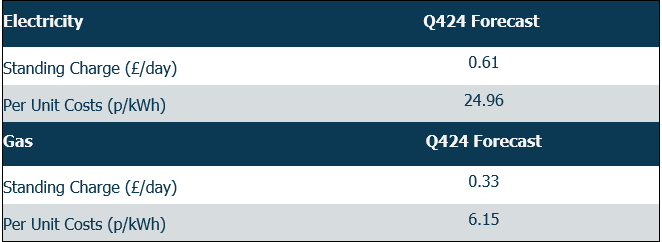"Most political parties have proposed reforms to how energy bills are structured, with a review of standing charges front and centre. However any change to bills creates winners and losers, so we urge whoever is in government come 5th July to proceed with caution."
Dr Craig Lowrey Principal Consultant
Cornwall Insight’s forecasts for the October-December 2024 Default Tariff Cap (price cap) have dropped to £1,723 a year for a typical dual fuel consumer1. This is a reduction of nearly £40 annually compared with our forecast in May.
Despite the drop in the prediction, this cap level would still represent a 10% increase from the £1,568 a year cap taking effect on 1st July. An uptick in the wholesale market is the central reason behind the predicted rise in October, with geopolitical concerns and supply-demand pressures having a resultant impact on the cap.
Looking ahead to 2025, we anticipate the January-March cap will stay at a similar level to October.
All the political parties have laid out their proposed energy policy with short-term commitments to review the composition of bills, including a review of standing charges, being included across many of the manifestos.
Shifting network costs away from standing charges to unit costs would benefit low-energy users and may encourage the take-up of energy efficiency measures and households to cut their energy use. However, any change will need to be balanced against the increase in costs which would occur for those in non-energy-efficient homes, including many vulnerable households.
Longer-term reforms including boosting renewable energy, implementing planning reforms, and enhancing energy efficiency, were also widely discussed across party platforms. It is hoped that a shift towards a UK based renewable energy supply, will deliver sustained lower cost bills. However, this transition will take time and substantial investment, therefore it is unlikely we would see any material reductions in bills from these efforts until 2030 at the earliest.
**Figure 1: Cornwall Insight’s Default Tariff Cap forecasts using Typical Domestic Consumption Values (dual fuel, direct debit customer) **

Source: Cornwall Insight
Figure 2: Default Tariff Cap forecasts, Per Unit Costs and Standing Charge (dual fuel, direct debit customer)

Source: Cornwall Insight Note: All figures are national average unless otherwise stated. All intermediate and final calculations are rounded to two decimal places. Totals may not add due to rounding.
Dr Craig Lowrey, Principal Consultant at Cornwall Insight said:
“The drop in forecasts for October are positive, but we need to keep this in perspective. We are still facing an average 10% increase in bills from October, and as winter approaches this will put a strain on many household finances.
“While long-term solutions are being developed, it’s critical to focus on immediate strategies to manage energy bills. Most political parties have proposed reforms to how energy bills are structured, with a review of standing charges front and centre. However any change to bills creates winners and losers, so we urge whoever is in government come 5th July to proceed with caution. Additionally, we would encourage greater discussion on other reforms, such as social tariffs, which could support the pursuit of lower bills over the following months and years.
“Looking to long-term bill reduction, we’ve heard pledges about investing in wind farms, solar power, nuclear energy, and other renewable infrastructure from various parties. However, concrete details on the implementation of these plans are scarce. It’s essential to be transparent with the public, these initiatives require substantial investment – and therefore cost – and time to come to fruition. While renewables are the path to sustainable bill reductions, it will take a long time for households to see these changes reflected in their bills.”
Reference:
Ofgem’s Typical Domestic Consumption Values (TDCVs) are now set at 2,700 kWh per annum for electricity, and 11,500 kWh per annum for gas. – Ends
Notes to Editors
For more information, please contact: Verity Sinclair at v.sinclair@cornwall-insight.com
To link to our website, please use: https://www.cornwall-insight.com/
Copyright disclaimer for commercial use of the press releases:
The content of the press release, including but not limited to text, data, images, and graphics, is the sole property of Cornwall Insight and is protected by UK copyright law. Any redistribution or reproduction of part or all of the content in any form for commercial use is prohibited without the prior written consent of Cornwall Insight.
Media Use Exemption:
The information included in this press release may be used by members of the media for news reporting purposes only. Any other commercial use of this information is prohibited without the prior written consent of Cornwall Insight.
All non-media use is prohibited, including redistribution, reproduction, or modification of our content in any form for commercial purposes, and requires prior written consent. Please contact: enquiries@cornwall-insight.com
About the Cornwall Insight Group
Cornwall Insight is the pre-eminent provider of research, analysis, consulting and training to businesses and stakeholders engaged in the Great British, Irish, Australian, German and Japanese energy markets. To support our customers, we leverage a powerful combination of analytical capability, a detailed appreciation of regulation codes and policy frameworks, and a practical understanding of how markets function.

